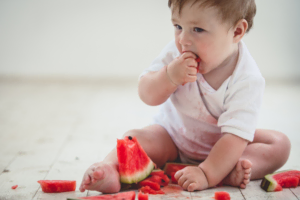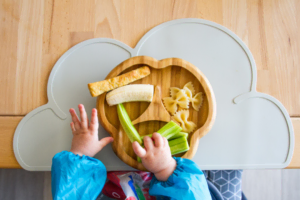The importance of finger food snacks is not just nutritional. It’s part of a developmental journey for babies aged 6-12 months. As a Clinical Paediatric Dietician, author and mother of 3, I’ve dedicated my life’s work to supporting parents and their little ones establish lifelong healthy feeding habits. I’m Kath Megaw, and in this article, I will share why finger foods are important for development and the significant role they play in developing your baby’s fine motor skills, hand-eye coordination, and self-feeding abilities. We will also explore the gradual progression from harder munchables to soft fruits and vegetables, ultimately aiding in your baby’s chewing skills.
Enhancing Fine Motor Skills and Hand-Eye Coordination
Introducing finger food snacks allows your baby to practice grasping and picking up objects using their tiny fingers. Initially, harder munchable options like mango slices or Biltong (dried, cured meat) can provide an excellent opportunity for your little one to hone their fine motor skills. As they learn to hold and manipulate these foods, their hand-eye coordination improves, paving the way for more complex tasks in the future.
 Transitioning to Soft Fruits
Transitioning to Soft Fruits
As your baby becomes more adept at picking up and holding snacks, you can gradually introduce softer fruits. This progression helps them explore different textures, flavours, and shapes. Soft fruits like bananas, ripe peaches, or avocados provide a safe and nutritious option for your baby to practice biting and chewing. The gradual shift from hard munchables to softer fruits encourages them to develop their oral motor skills and strengthens the muscles needed for chewing and swallowing.
Introducing Soft Vegetables
Once your baby has mastered soft fruits, it’s time to introduce soft vegetables. Carrots, sweet potatoes, and steamed broccoli florets are excellent options. These foods not only offer vital nutrients but also encourage your little one to further refine their chewing abilities. Soft vegetables provide a different texture and taste experience while promoting healthy eating habits from an early age.
 Gradual Progression to Chewing Foods
Gradual Progression to Chewing Foods
As your baby grows more confident in their chewing skills, you can gradually introduce foods that require more effort to chew. This includes small pieces of cooked pasta, soft meats, or well-cooked grains. Chewing more challenging textures stimulates jaw development and strengthens the muscles involved in eating. Remember to cut the food into appropriately sized pieces to reduce the risk of choking and always supervise your baby during mealtime.
Dissolvable Foods and Self-Feeding
As your baby approaches their first birthday, they can begin experimenting with dissolvable snacks like puffed rice cereal, baby crackers, or teething biscuits. These foods are designed to dissolve easily in the mouth, reducing the risk of choking while allowing your baby to practice self-feeding. Encouraging self-feeding not only fosters independence but also supports their hand-eye coordination and fine motor skills further.
In conclusion, introducing finger food snacks during the 6-12 month age range offers numerous developmental benefits for your baby. From enhancing fine motor skills and hand-eye coordination to promoting self-feeding and strengthening oral motor skills, this journey of exploring different textures and flavours is an essential part of their growth. By gradually progressing from harder munchables to soft fruits, vegetables, and more challenging chewing foods, you are helping your baby develop the necessary skills for a lifetime of healthy eating. Remember to always supervise your little one during mealtimes and ensure that the foods provided are appropriate for their developmental stage.
For more guidance and delicious weaning recipes, download Parent Sense and access a world of science-based, successful weaning.

 Transitioning to Soft Fruits
Transitioning to Soft Fruits
 Gradual Progression to Chewing Foods
Gradual Progression to Chewing Foods


